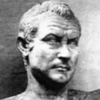Plautus

Plautus
Titus Maccius Plautus, commonly known as Plautus, was a Roman playwright of the Old Latin period. His comedies are the earliest Latin literary works to have survived in their entirety. He wrote Palliata comoedia, the genre devised by the innovator of Latin literature, Livius Andronicus. The word Plautine /ˈplɔːtaɪn/ refers to both Plautus's own works and works similar to or influenced by his...
NationalityRoman
ProfessionPlaywright
men doe knows
Man is not man, but a wolf to those he does not know.
knowledge wells knows
It is well for one to know more than he says
knows
That which you know, know not; and that which you see, see not.
worst knows
It is best to know the worst at once.
evil knows
The evil that we know is best.
desire trouble knows
Know this, that troubles come swifter than the things we desire.
ignorance knows
Know not what you know, and see not what you see. [Lat., Etiam illud quod scies nesciveris; Ne videris quod videris.]
brother badness knows
There's no such thing, you know, as picking out the best woman: it's only a question of comparative badness, brother.
hope good-things disappointed
For I know that many good things have happened to many, when least expected; and that many hopes have been disappointed.
years ability
Wisdom is not attained by years, but by ability
best
Keep what you have; the known evil is best.
composed friendship inhabiting
Friendship is composed of a single soul inhabiting two bodies.
adorned beauty character gift jewels rather
I would rather be adorned by beauty of character than jewels. Jewels are the gift of fortune, while character comes from within.
political politics doe
A mouse does not rely on just one hole.